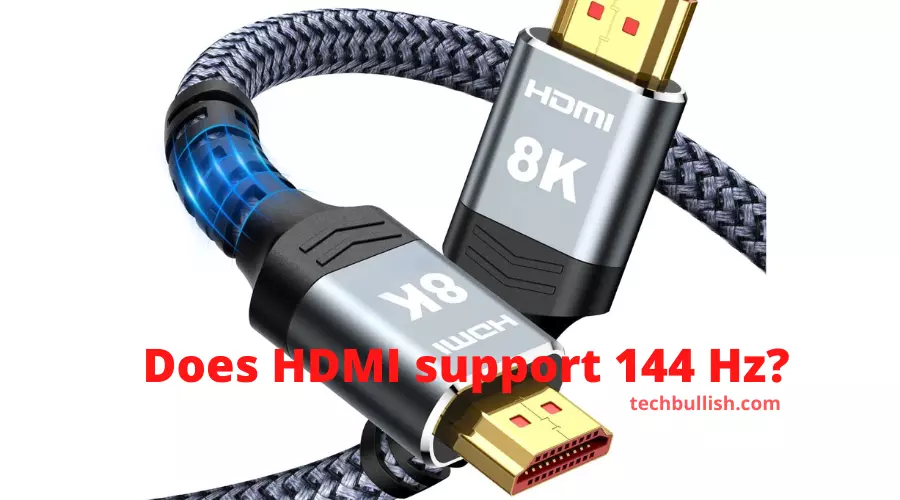In modern games, we use Monitors that go up to 144Hz or even higher, and competitive gamers use these monitors.
At 144Hz FPS games are very smooth and enjoyable.
But, to get the 144Hz refresh rate, the connecting wire connecting the monitor and the PC would be crucial, i.e., the HDMI cable.
So, does HDMI support 144Hz?
In this blog, I would look into this and also which version of HDMI supports and performs well with 144hz and beyond.
HDMI is a digital interface that can transmit both video and audio, and it was designed to replace analog video connections, such as the VGA connector.
The HDMI standard supports a range of resolutions and refresh rates, including 4K at 60Hz, 1080p at 120Hz, and 1080p at 144Hz.

Let’s get started!
What is HDMI?
HDMI stands for High Definition Multimedia Interface. It’s a standard that supplies digital audio/video signals from a source to a display.
HDMI supports HDTV (High Definition TV) and HD video quickly becomes the most popular consumer cable.
There are several different versions of HDMI, with version 2.0 being the most recent.
What is Refresh Rate?
The refresh rate is the number of times that the display panel updates the image in a second. If the refresh rate is high, there will be a lesser chance of the user getting a display stutter.
The refresh rate of most monitors is limited to 60Hz, which means it refreshes 60 times per second.
Some monitors, however, support a refresh rate of up to 144Hz, which means it refreshes 144 times per second.
144Hz Refresh Rate for Gaming
In the case of a 144Hz monitor, it shows images on display 144 times per second.
This is to reduce the lag time between the input and the response, giving the user a more fluid gaming experience.
This is especially important for competitive gamers, as the less lag there is between the user’s movement and the response on the screen, the more likely they are to win the game.
Does HDMI support 144Hz?
HDMI supports 144Hz depending on the bandwidth, resolution, and HDMI version.
All HDMI versions ranging from HDMI 1.3 to HDMI 2.1 have sufficient bandwidth for 144Hz.
Notably, compression, color, resolution, or color should be sacrificed.
HDMI 2.1 is the most excellent version of HDMI, and it’s also the latest innovation with the most significant support for the 144Hz with less compromise.
Which Generation of HDMI supports 144Hz?
The 1.4 HDMI generation supports 144Hz at 1920×1080.
However, you will note that not all the monitors fitted with HDMI 1.4 support 144Hz.
Older gaming monitors are limited to approximately 60Hz over the HDMI, and most monitors equipped with HDMI 1.4 are also limited to support 120Hz at 1080p.
HDMI 144Hz Support through Generations
| HDMI Generation | 144Hz Support | Max Refresh Rate(Hz) at Full HD resolution |
| HDMI 1.0-1.2 | Not supported | 60Hz @1920×1080 |
| HDMI 1.3 | Yes, with 144Hz can go up to 1920×1080 | 144Hz @1920×1080 |
| HDMI 1.4 | Yes, with 144Hz can go up to 1920×1080 | 144Hz @1920×1080 |
| HDMI 2.0 | Yes, with 144Hz can go up to 2560 × 1440. | 240Hz @1920×1080 |
| HDMI 2.1 | Yes, with 144Hz can go up to 5k resolution (5120 × 2160) at a 21:9 aspect ratio. | 480Hz @1920×1080 |
Which cable would you need to support 144Hz?
HDMI 1.4 would support 144Hz @1920×1080.
However, if playing at a higher resolution is needed, HDMI 2.0 would support 144Hz @2560×1440, and HDMI 2.1 would support 144Hz @5120×2160.
Having an HDMI 2.0 or 2.1 is better to play at a higher resolution.
Also, consider Ultra High-speed HDMI cables if you would like to play at High FPS at a higher resolution.
If you play games at 4k resolution at Higher FPS, then HDMI 2.1 would be an excellent choice.
Last update on 2025-06-22 / Images from Amazon Product Advertising API
Can any HDMI cable support 1080p at 144Hz?
HDMI 1.4 cable, Dual-Link DVI, or the DisplayPort support 1080p at 144Hz.
In addition, for the 1440p with 144Hz, you need the latest generation of 2.0 HDMI or the 1.2 DisplayPort.
1.4 DisplayPort with 1.2 DSC or HDMI 2.1 works for the 4K at 144Hz.
Does HDMI support 144Hz at 1440p?
HDMI 2.0 and HDMI 2.1 supports 144Hz at 1440p(2560×1440).
HDMI 2.0 is a standard modification that can be used for 60Hz at 4K, 144Hz at 1440p, and 240Hz at 1080p.
The latest version, HDMI 2.1, supports 60Hz at 8K and 120Hz at 4K UHD.
Also, to get 144Hz at 1440p, you need a 144Hz monitor and a Graphics card which supports 144Hz at 1440p.
Combining the proper CPU hardware with the HDMI 2.0 or more can easily help you get 144Hz at 1440p.
Does HDMI support 144Hz 4k?
Currently, graphic cards, monitors, and televisions feature the latest HDMI 1.4 port to support 30Hz at 4K, 75Hz at 1440p, and 144Hz at 1080p.
Most 144Hz monitors support only up to 120Hz over the HDMI 1.4.
However, some monitors tend to utilize pixel rates and customized timing parameters, among others, to ensure the HDMI can support 144Hz at 4K.
Does HDMI 2.0b support 144Hz?
The HDMI 2.0b supports 144Hz and 120Hz at lower resolutions.
Even though HDMI 2.0b is enough for the 4K resolution, the set can only have the 60Hz maximum frame rate.
To reach 144Hz, the resolution should be dropped to 1080p or 1440p.
HDMI 2.0b is a slightly upgraded version of HDMI 2.0 with additional HDR, WCG, and Hybrid Log Gamma features.
Last update on 2025-06-26 / Images from Amazon Product Advertising API
Conclusion
Let’s conclude the post on whether HDMI does support 144Hz!
HDMI cables are widely available and support 144Hz whenever you go for any HDMI cable with version 1.3 and above.
HDMI cables are designed to support high-speed data transfer rates, which makes them capable of supporting a broad range of HDMI features.
HDMI cables have been designed to support enhanced video resolutions, such as 4K.
HDMI cables also support high-speed data transfer rates, including audio return channels (HDMI ARC).
I hope you are enjoying reading the post.

I’m Anirban Saha, Founder & Editor of TechBullish. With a B.Tech in Electronics and Communication Engineering, and 6+ years of experience as a software developer, I have expertise in electronics, software development, gadgets, and computer peripherals. I love sharing my knowledge through informational articles, how-to guides, and troubleshooting tips for Peripherals, Smart TVs, Streaming Solutions, and more here. Check Anirban’s Crunchbase Profile here.





